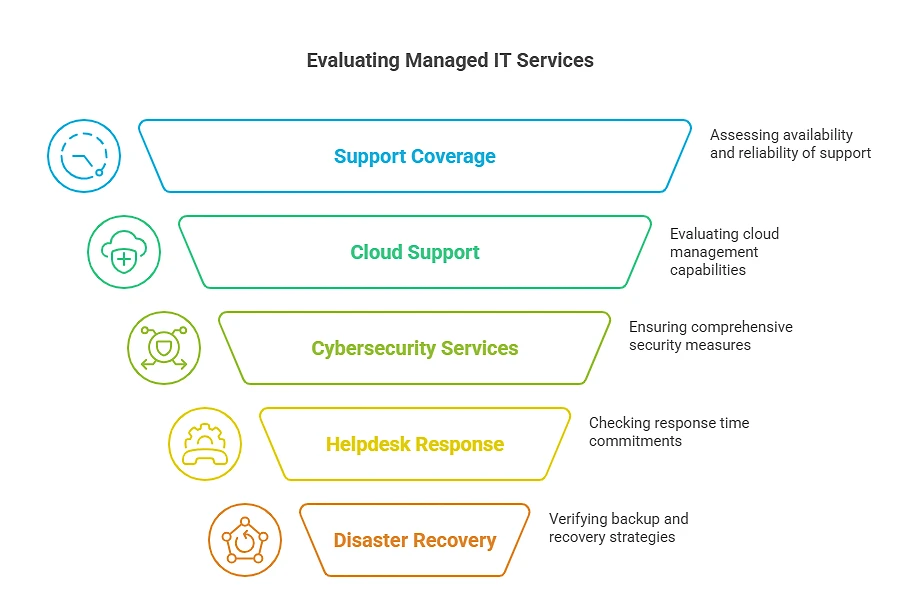Selecting an IT partner is one of the hardest technology decisions you will make. A poor choice can leave you with weak support, higher costs, and recurring downtime.
Despite recession concerns among 84% of leaders, 66% of businesses still planned to increase IT spending in 2024. This shows how complex IT has become, and how important it is to get the right help.
Chad Cunningham, Owner and Partner of Ironclad TEK, says, “The right MSP should simplify your IT, strengthen your security, and scale with your business.”
This blog will guide you through how to choose a managed services provider by breaking down vendor selection criteria, key qualifying questions, and practical checklists.
You will learn what to ask, what to look for, and how to spot red flags so you can make an informed decision with confidence.
Secure the Managed Services Partner You Deserve!
Why Choosing the Right MSP Matters
Technology powers your daily operations, customer experience, and long-term growth. A poor provider can lead to costly downtime, weak security, and compliance risks. The right MSP, on the other hand, becomes a strategic asset.
Key benefits of choosing the right MSP:
- Cost Predictability: Fixed monthly fees help you avoid surprise expenses and budget confidently.
- Fast Response Times: Quick support prevents small issues from becoming major disruptions.
- 24/7 Monitoring: Around-the-clock oversight keeps systems secure and minimizes downtime.
- Access to Expertise: You gain specialized skills without the cost of hiring full-time IT staff.
- Stronger Security & Compliance: 33% of energy firms received a C grade or below for security, pointing to serious vulnerability. A reliable MSP helps protect your data and meet industry regulations.
Managed Services Selection Criteria Every Business Should Consider
Choosing the right MSP goes beyond comparing prices. You need to evaluate qualities that determine long-term reliability, scalability, and strategic fit.
Industry Experience
A strong MSP understands your sector’s compliance and operational needs.
- Providers serving both energy and professional services show adaptability across complex environments.
Service Range
Look for broad coverage, not just desktop or network support.
- Ideal MSPs offer cloud hosting, cybersecurity, disaster recovery, and co-managed options.
Scalability & Flexibility
Your IT needs will evolve.
- Ask how the provider scales services without requiring a full system overhaul.
Reliable SLAs
Service-level agreements define accountability.
- Look for guaranteed response times and transparency. Vague SLAs are a red flag.
Financial Stability & Reputation
An unstable MSP puts your business at risk.
- Review awards, financial health, and client retention. Long-term relationships signal dependable service.
Once you evaluate these areas, you can move into practical discovery, asking the right questions before you sign.
Questions to Ask an MSP Before You Sign
A checklist is helpful, but real insight comes from asking the right questions. These conversations help you gauge whether a provider can meet your current needs and scale with you over time.
Support & Response Times
Understanding how quickly issues are resolved is critical. Ask about:
- Helpdesk hours and availability
- On-site support options
- Escalation process to senior technicians
- SLA-backed response times (e.g., 30 minutes for critical outages)
Technical Capabilities
Make sure the MSP can handle your infrastructure and security needs. Ask about:
- Experience with virtualization and backup solutions
- Managed detection and response capabilities
- Support for multicloud environments (e.g., Azure, AWS, Google Cloud)
Discovery & Planning Approach
Discovery calls reveal how the MSP thinks long-term. Ask how they:
- Handle compliance and regulatory requirements
- Plan for business continuity and disaster recovery
- Adapt services to complement your in-house IT team
Asking strong questions ensures you get clear commitments instead of vague promises. The next area to explore is security.
| More articles you might like: |
Managed Services Questions to Ask About Security
Cybersecurity should be a top priority. Businesses of every size face growing risks from phishing, ransomware, and data theft.
According to IBM’s 2025 Cost of a Data Breach Report, the average cost of a cyber incident reached $4.44 million in 2025. This shows why you cannot afford to ignore protection when evaluating MSPs.
If you want to know how to choose managed security services, start by asking specific questions. Check whether the provider offers 24/7 monitoring, intrusion detection, and next-generation firewalls. Ask about their incident response process and whether they run a Security Operations Center (SOC).
Strong managed services qualifying questions about security should cover:
- Monitoring and Detection: Do they provide round-the-clock monitoring and managed detection and response?
- Vendor Patch Management: How quickly do they deploy vendor updates?
- Security Awareness Training: Do they train staff on phishing, social engineering, and password management?
The answers will show you whether the provider treats security as an add-on or a core service. With security covered, you should also use a structured checklist to compare MSPs.
Using a Managed IT Services Checklist

A managed IT services checklist makes comparisons easier. It reduces guesswork and ensures every MSP is evaluated on the same standards.
Key areas to include in your checklist are:
- Support Coverage: Does the MSP provide 24/7 support, or only during business hours? Around-the-clock service reduces downtime risks.
- Cloud and Virtualization Support: Can the provider manage both private and public cloud environments? Check whether they have certified cloud engineers.
- Cybersecurity Services: Confirm that advanced protection is included, not sold separately.
- Helpdesk Response Times: Review SLA commitments to confirm realistic response windows.
- Disaster Recovery and Backup: Ask how they handle data backup frequency and recovery testing.
Flexera State of the Cloud Report 2025 found that 60% of organizations will rely on managed services to host critical workloads. This highlights why your checklist must include long-term scalability and resilience. After building your checklist, the next step is building a questionnaire for internal planning.
Managed IT Services Questionnaire for Internal Planning
A managed IT services questionnaire helps you assess your own needs before contacting providers. This ensures you only pursue MSPs that match your goals.
Sample questions include:
- What IT functions should stay in-house? Some companies prefer to keep application development or compliance management internal.
- Where do we lack expertise? Identifying skill gaps helps you target MSPs with the right expertise.
- What compliance rules apply to our industry? Regulated industries need MSPs that can prove compliance with frameworks like HIPAA, GDPR, or PCI-DSS.
These questions help you narrow the field before you begin negotiations. They also prepare you to identify red flags in MSP proposals.
Red Flags When Evaluating Managed Services Providers
Not every MSP is a good fit. You must be alert to signs that indicate weak support or poor reliability.
- Vague Answers: If a provider can’t clearly explain their monitoring or SLAs, they may lack strong processes and reliability.
- Uptime Claims without Proof: Promising 100% uptime is meaningless without monitoring reports or client references to back it up.
- No Scalability Plan: A good MSP should grow with your business. If they can’t scale services, it’s a sign of limited capability.
- Missing Testimonials: Lack of customer references often signals poor retention or weak service quality. Trusted MSPs have happy clients.
Once you filter out weak providers, focus on how to choose a partner for long-term success.
How to Choose a Managed IT Provider for the Long Term
The right provider should be more than a vendor. They should act as a partner who grows with your business. That is why you must know how to choose a managed IT provider who aligns with your long-term strategy.
Evaluate whether the MSP offers advisory services like vCIO to help plan future technology investments. Ask how they adapt services as business needs evolve. Strong providers bring stability, scalability, and proactive planning.
With this approach, you not only fix today’s problems but also prepare your business for the future. This leads directly into the final considerations.
Final Thoughts on How to Choose a Managed Services Provider
Choosing an MSP requires more than comparing prices. You must use managed services vendor selection criteria, strong qualifying questions, a checklist, and an internal questionnaire. These tools ensure you find a partner who supports growth and protects your IT environment.
The right choice will deliver stability, lower costs, and stronger security. That’s why the final step is acting on your selection process with confidence.
Comparing MSP Evaluation Areas
Before you close your selection process, it helps to compare MSPs across clear categories. This table highlights areas you can use to score providers.
| Evaluation Area | What to Look For | Why It Matters |
| Service Coverage | 24/7 helpdesk, escalation paths | Prevents downtime and ensures quick response |
| Security Services | SOC, patching, MDR, training | Protects against evolving cyber threats |
| Cloud Support | Multicloud, hybrid, certifications | Ensures flexibility for future workloads |
| SLA Commitments | Documented response and resolution times | Guarantees accountability and service quality |
| Customer References | Case studies, testimonials, industry awards | Confirms provider reliability |
| Financial Stability | Industry recognition, retention rates | Reduces risk of provider collapse |
Scoring each MSP against these areas gives you a clear comparison before you commit.
Choose Ironclad TEK for Trusted Managed Services
Selecting the right partner is about more than support. It is about choosing a provider who delivers long-term value and stability.
Ironclad TEK has been serving businesses for 20 years with proven expertise and a five-year average client retention rate.
We manage IT for 34 companies, including 14 in the energy sector, with SLA-backed response times that meet the highest standards.
| Trusted IT Services Near You | ||
| Airdrie | Calgary | Okotoks |
If you are ready to work with a provider that combines deep technical expertise with enterprise-class services for SMBs, contact us today to schedule a free IT assessment and consultation.





